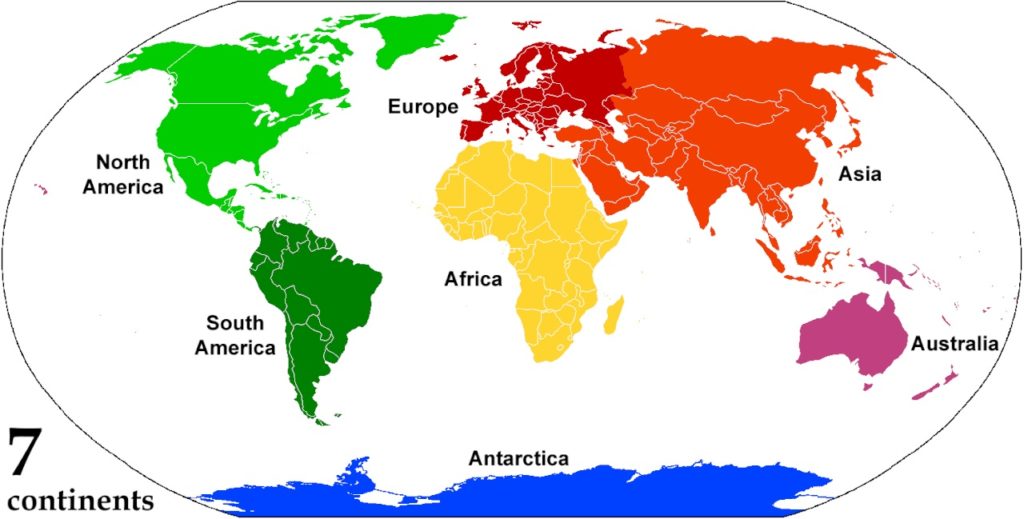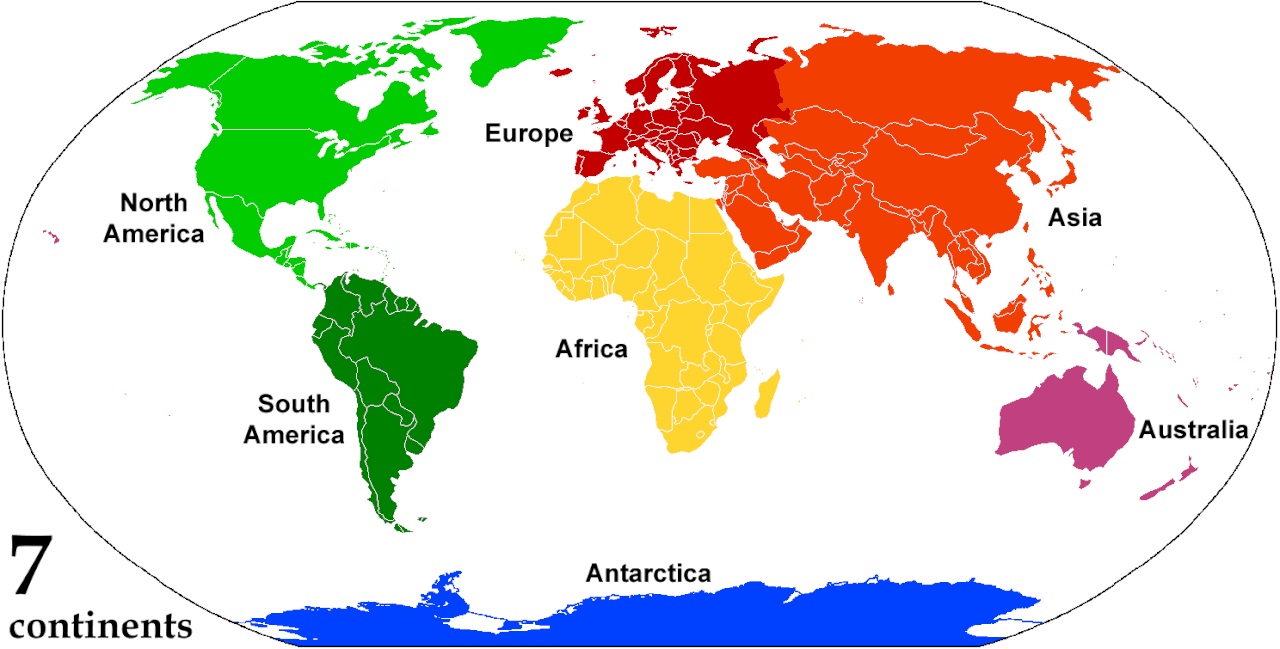
Where did the names of the continents come from? Generally, from Greek and Latin.
There are seven continents and one continent that is almost completely underwater. In order of size, the continents are Asia, Africa, North America, South America, Antarctica, Europe, and Australia. The submerged eighth continent is Zealandia. The only part of Zealandia that is above water is New Zealand.
So, where did the names of the continents come from? And when I say the names, I mean the names that we use in English. I know different languages have different names for them. The idea of naming continents only really came about during the “Age of Exploration” in the 16th and 17th centuries. People explored, drew maps, and saw that the world could be divided up into easy blocks they called continents. Let’s look at them in order of size.
Asia is the biggest. It covers 44.58 million km2, which is 29.9% of the land area on Earth. The name asia comes from the Greek word Ἀσία. It was used by the Greek historian Herodotus when he wrote his histories in about 440 BC. He used the word to refer to the Persian Empire. By the end of the Greek empire, the word referred to most of what is now Turkey. The Romans took the word on, and it gradually became known through Europe. Over time, it came to refer to more and more of what is now Asia. So, did Herodotus invent the word? It seems he used a word that already existed. There are two theories as to where it came from. The first is that it comes from the Aegean word asis that meant muddy and silty and was used to describe the eastern shore of the Aegean Sea. The second theory is that it comes from the Phoenician word asu that meant rising and probably referred to the sunrise. This in itself may have come from a Hittite word. The Hittite language existed from about 2000 BC and died out by the end of the Bronze Age.
Africa is the second largest. It covers 30.37 million km2, which is 19.1% of the land area on Earth. The name Africa comes from Latin. The Ancient Romans used it to refer to the area of Africa around Tunisia that they had conquered in about 146 BC. It is said that they named it after a tribe called the Afri. In Latin, adding ica is used to show a landmass. So, afri+ica meant the land of the Afri. This is how the word came into English. The Romans used it to apply to their province and the word became known across Europe. However, as with Asia, they probably heard the name somewhere and used it. In this case, they didn’t get it from the Greeks. The Greeks used the word Libya to refer to Africa and they actually used the Nile River as the dividing line between Asia and Libya. Some Medieval maps still use the word Libya to refer to Africa. There is a theory that the word Africa came from the Phoenician word afar, which meant dust. It could have also come from the Ancient Egyptian word afuruika, which meant “turning towards ka (the birthplace)”. There is no way of knowing.
North and South America are the third and fourth largest continents. Together, they cover 42.55 million km2, which is slightly smaller than Asia. The origin of the name America is slightly easier to trace. They were named after the explorer Amerigo Vespucci. Vespucci was an explorer who sailed to the New World on behalf of Spain and Portugal. During the second trip, in 1501, he landed in Brazil and realized that he was standing on an entirely new continent. He wrote back to Portugal and a German cartographer, Martin Waldseemuller, created the first map that included the New World and he put America on South America. He took Amerigo and added ica to indicate landmass, as the Romans did with Africa. And America was born. A thousand copies of the map were printed and America was set.
Antarctica is the fifth largest continent. It is 13.66 million km2. It was named in 1880 and officially in 1904. Antarctica was discovered in 1821. Explorers knew it was there, but John Davis was the first person to walk on it in 1821. The name came from Antarctic, which just means “opposite to the arctic”. The word arctic came from the Greek arktos, which meant bear because the constellation Ursa Major could be seen in the sky. After Antarctica was discovered, it needed a name. Sir John Murray, who had confirmed it to be a continent, suggested adding ica to Antarctic. John George Bartholomew made the first map of the area in 1880 and he used Murray’s suggestion, and Antarctica was born.
Europe is the sixth largest continent. It is 10.53 million km2. The name Europe comes from Ancient Greek. It was first used in 522 BC. As to how the Greeks came by it, there are several theories. It could have been named after the Greek god, Europa, but it is likely that its origins lie with the Phoenicians or the Akkadians, who lived in Mesopotamia. The Phoenicians used the word yurub, which meant west. The Akkadians used the word ereb, which meant darkness or descent, probably meaning sunset, or the west. The expression Europe was not really used much until the 8th century. The Romans had no need for a word for the continent because they didn’t see Europe as a continent, just a collection of their provinces. It was used when Christian rulers wanted to have a way of separating Christian European countries from non-Christian countries.
Australia is the smallest continent. It is 7.688 million km2. Its name is fairly easy to explain. For fifteen hundred years before it was found, people speculated that there was an unknown landmass in the southern hemisphere. The logic was that the continents would probably be balanced out. In Latin, “unknown” is incognita, “southern” is australis, and “land” is terra. So, it was called Terra Australis Incognita. After Australia was found by Europeans, Matthew Flinders suggested “Australia” as the name. The British Admiralty agreed in 1824 and the country was officially called Australia.
Zealandia, the underwater continent was named by adding ia, for landmass, to New Zealand.
So, all of the continents got their names in different ways. Many of them came from Greek or Latin, but their true origins may be lost to time. And this is what I learned today.
Sources
https://www.etymonline.com/search?q=asia
https://en.wikipedia.org/wiki/Asia_(Roman_province)
https://education.nationalgeographic.org/resource/Continent
https://en.wikipedia.org/wiki/List_of_continent_name_etymologies
https://www.sahistory.org.za/article/africa-whats-name
https://www.etymonline.com/search?q=africa
https://en.wikipedia.org/wiki/Amerigo_Vespucci
https://en.wikipedia.org/wiki/Antarctica
https://www.etymonline.com/search?q=america
https://en.wikipedia.org/wiki/List_of_continent_name_etymologies
https://www.etymonline.com/search?q=europe
https://www.babbel.com/en/magazine/continent-etymology
https://history.howstuffworks.com/historical-events/naming-continent.htm


[…] changed, and the monsoon moved further south. This will repeat for as long as the continent of Africa is where it is, and the Sahara is predicted to be green again in about 15,000 years. I wonder if I […]